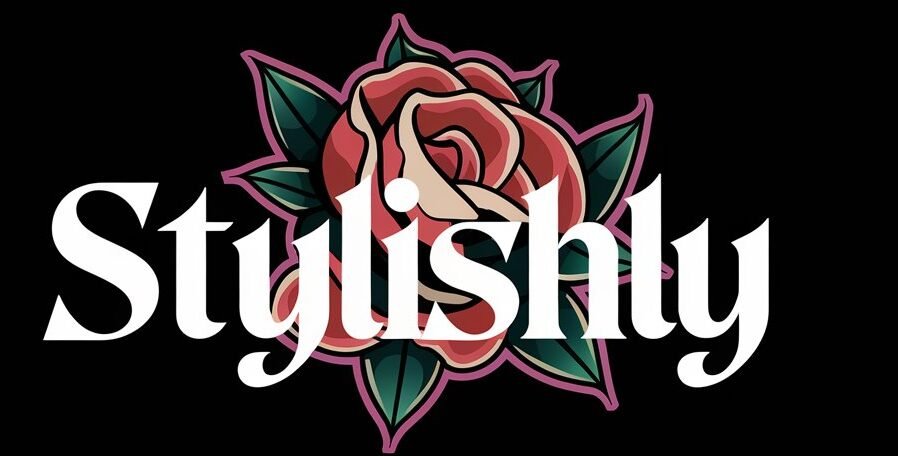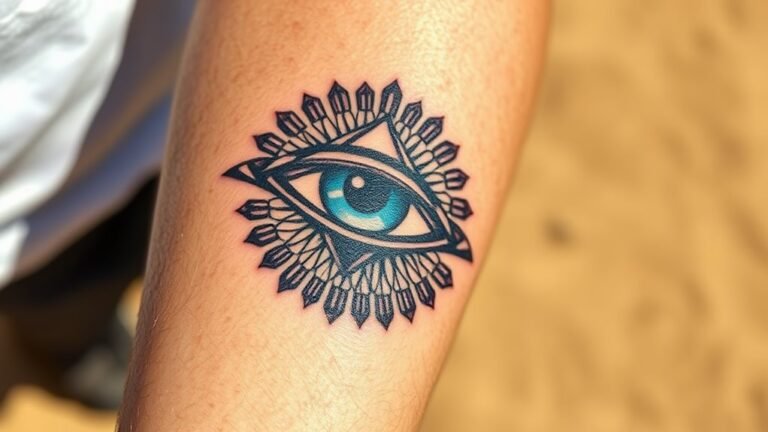Egyptian Eye Tattoo Meaning and Symbolism
When you consider the significance of the Egyptian Eye tattoo, you're not just looking at a striking design; you're engaging with a rich tapestry of history and symbolism. This emblem, often linked to the Eye of Horus, carries meanings of protection, healing, and even royal authority. As you explore its various interpretations and the personal stories behind it, you might find that its allure goes beyond mere aesthetics. What deeper connections might this ancient symbol have for those who choose to wear it?
In a Nutshell
- The Egyptian Eye tattoo symbolizes protection and royal power, rooted in the mythology of Horus and the concept of Ma'at (truth and balance).
- It represents a legacy of resilience and healing, encouraging personal growth and introspection through its spiritual significance.
- The tattoo fosters community and connection among wearers, promoting shared experiences and discussions about identity and spirituality.
- Various styles, including traditional and minimalist, allow for customization, making it popular among younger generations and at tattoo conventions.
- The Eye tattoo serves as a reminder of personal journeys, enhancing self-esteem and empowering self-expression for many individuals.
Historical Background
While many cultures have used tattoos as a form of expression, the Egyptian eye tattoo, often associated with the Eye of Horus, carries a deep historical significance.
Its mythological origins trace back to ancient practices in Egypt, where the symbol was believed to provide protection, health, and restoration.
You'd find these tattoos adorning both the living and the deceased, serving as a powerful link to the divine.
This connection reflects a society deeply rooted in spirituality and a belief in the afterlife.
The Eye of Horus
The Eye of Horus, known as "Wedjat," symbolizes protection and royal power in ancient Egyptian culture. This powerful eye symbolism draws from Horus mythology, where the falcon-headed god represents both the sky and kingship.
By sporting the Eye of Horus tattoo, you connect with a rich tradition that transcends time, offering a sense of belonging to a larger narrative. You embrace the essence of vigilance and restoration, reflecting the ancient Egyptians' belief in Horus's ability to heal and protect.
As you wear this emblem, you aren't just showcasing art; you're honoring a legacy that resonates with those seeking strength, safety, and a profound connection to history. The Eye of Horus becomes your personal talisman, bridging past and present.
Symbolism of Protection
Carrying the Eye of Horus tattoo often invites a deeper exploration of its broader symbolism, particularly the concept of protection. This ancient symbol embodies powerful protective energies, rooted in ancient beliefs that the Eye safeguarded against evil and misfortune.
When you wear this tattoo, you're embracing a legacy of resilience, as it's believed to grant you strength in the face of adversity. The symbolic meanings extend beyond mere aesthetics; they connect you to a rich historical narrative where warriors donned the Eye for safety in battle.
Healing and Restoration
As you explore the meaning behind the Eye of Horus tattoo, you'll discover its profound connection to healing and restoration.
This ancient symbol embodies a journey towards spiritual healing and emotional restoration, resonating deeply within those who seek solace and renewal.
- Represents the cycle of life and rebirth
- Encourages self-reflection and introspection
- Connects you with a community of seekers
- Symbolizes protection during times of vulnerability
Royal Power and Authority
While many view the Eye of Horus merely as a symbol of protection, its deeper connotation relates to royal power and authority in ancient Egyptian culture.
This emblem was integral to royal iconography, signifying the divine authority bestowed upon pharaohs. When you wear this tattoo, you're not just adorning your skin; you're connecting to a lineage that revered the Eye as a mark of sovereignty.
Each glance at the tattoo can remind you of the strength and wisdom tied to the rulers of the past. By embracing this symbol, you align yourself with a rich tapestry of history, where the Eye stands as a representation of protection and the unyielding grip of power that once governed the Nile.
Different Styles of the Tattoo
The Eye of Horus tattoo manifests in a variety of styles, each reflecting personal significance and cultural interpretation.
You can choose from traditional designs that echo ancient artistry or modern minimalist styles that emphasize simplicity. Each style serves as a canvas for your individuality, connecting you to a rich heritage.
- Traditional Designs: Elaborate, colorful representations often incorporating Egyptian motifs.
- Minimalist Styles: Simple lines and shapes that convey elegance and clarity.
- Geometric Patterns: Intricate shapes that add depth and dimension to the eye.
- Watercolor Techniques: Soft, flowing colors that breathe life into the symbol.
Your choice of style can evoke a sense of belonging, as it intertwines your story with an ancient legacy.
Cultural Significance in Ancient Egypt
In ancient Egypt, the Eye of Horus symbolized protection, health, and restoration, serving as a powerful emblem in both daily life and spiritual practices. This symbol wasn't just an artistic choice; it held deep cultural significance.
You'd find it adorning amulets, tombs, and even the skin of those who sought its blessings. During ancient rituals, priests invoked the Eye to safeguard the deceased on their journey to the afterlife, weaving it into cultural practices that connected the living with the divine.
As you explore these ancient traditions, you'll sense a community deeply intertwined with their beliefs, where the Eye of Horus represented more than mere decoration—it was an essential part of their identity and a reflection of their shared spirituality.
Modern Interpretations
As people navigate contemporary spaces where ancient symbols hold new meanings, the Eye of Horus has evolved into a multifaceted emblem representing protection and awareness in modern tattoo culture.
This cultural fusion brings together historical significance and personal expression, allowing you to connect with a rich heritage while embodying contemporary designs.
- It signifies spiritual awakening and insight.
- You can interpret it as a talisman against negativity.
- The design often incorporates modern artistic elements, blending styles.
- It serves as a reminder of resilience, drawing from ancient mythology.
In this way, the Eye of Horus resonates with those seeking belonging, promoting a shared understanding of strength and vigilance across diverse communities.
Popularity Among Tattoo Enthusiasts
While many tattoo enthusiasts seek designs that resonate on a personal level, the Eye of Horus stands out for its rich historical roots and contemporary appeal.
This symbol has evolved alongside tattoo trends, making it a favorite among those who appreciate both tradition and modernity. As you explore this design, you'll find it embodies protection, healing, and divine insight, weaving a narrative that connects you to a larger cultural tapestry.
The Eye's versatility allows for unique interpretations, appealing to a diverse array of individuals. Whether you're drawn to its ancient significance or its current fashion statement, the Eye of Horus fosters a sense of belonging within the tattoo community, celebrating both legacy and innovation in design evolution.
Placement and Design Considerations
Where might you place an Eye of Horus tattoo to best honor its significance? Your choice of placement options can enhance its meaning and connection to your personal journey. Consider these elements when planning your design:
- Forearm: Easily visible, symbolizing protection and awareness.
- Back: A larger canvas allows for intricate design elements, representing strength and spirituality.
- Ankle: A subtle placement that conveys personal significance, often kept close to the ground.
- Chest: Centered over the heart, it embodies deep emotional connections.
Each option offers a unique way to express the Eye of Horus's powerful symbolism while reflecting your identity. Choose thoughtfully, as the placement and design elements together can forge a meaningful bond with your tattoo.
Personal Meanings and Stories
How does the Eye of Horus resonate with your personal journey? For many, this symbol embodies protection and healing, reflecting your unique narrative.
Perhaps you've faced challenges that required resilience, and the Eye reminds you of your strength. Your personal stories may intertwine with the ancient wisdom this emblem represents, creating a bridge between cultures and experiences.
In moments of vulnerability, the Eye serves as a beacon, guiding you toward meaningful experiences. You might wear it as a tattoo, not just as body art but as a reminder of your growth and the connections you forge.
Sharing your journey with others who appreciate the Eye's significance fosters a sense of belonging, creating a community bound by shared values and stories.
Frequently Asked Questions
How Painful Is Getting an Egyptian Eye Tattoo?
Getting an Egyptian eye tattoo can vary in pain, depending on your pain tolerance and the tattoo placement. Areas with more muscle and fat generally hurt less, while bony spots can be more intense.
What Colors Are Commonly Used in Egyptian Eye Tattoos?
When choosing colors for your Egyptian eye tattoo, you'll notice vibrant hues like deep blues, greens, and golds. These colors carry significant symbolism, reflecting protection and health, inviting a deeper cultural connection to your design.
Can the Eye of Horus Be Incorporated Into Other Designs?
You can definitely incorporate the Eye of Horus into other designs. This design fusion enhances eye symbolism, creating a meaningful piece that resonates with personal stories, cultural heritage, and a sense of belonging within a community.
What Should I Consider Before Getting This Tattoo?
Before getting this tattoo, consider the design placement and how it resonates with your personal significance. Think about the message you want to convey, ensuring it aligns with your identity and cultural connections.
Are There Any Cultural Appropriation Concerns With This Tattoo?
When considering this tattoo, you should reflect on its historical significance and the importance of cultural sensitivity. Understanding the origins helps you appreciate its value, ensuring you honor the culture rather than appropriate it.







